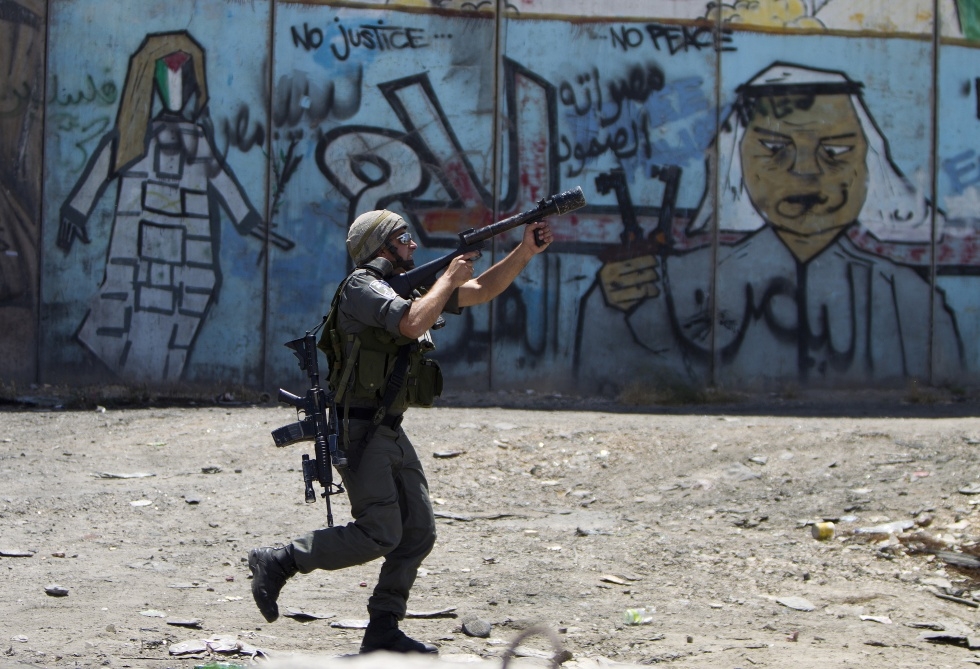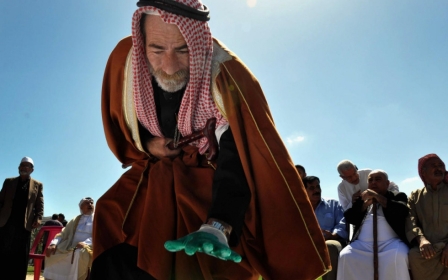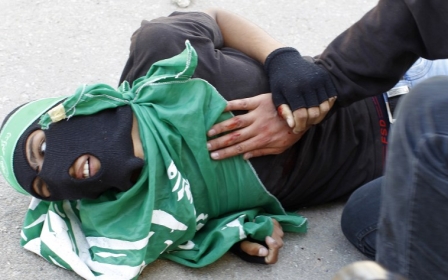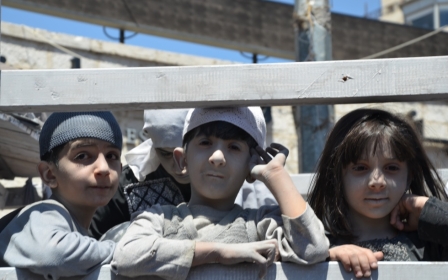Israel's changing Nakba narrative

The Israeli response to Nakba Day events this year involved clampdown on demonstrators in the West Bank, most lethally in Betunia, where two Palestinian teenagers - Muhammad Abu Daher and Nadim Siam - were shot dead. There was a miffed reflection by Prime Minister Benjamin Netanyahu about how the Palestinians Authority sounds a memorial siren “to mourn the establishment of the State of Israel”, and a call by a former Lieberman minister to withdraw funding from Tel Aviv University under the “Nakba Law”. The law allows the state to deny funding to public institutions marking the establishment of the State of Israel as an occasion for mourning, and the ex-minister argued the university fell afoul of it by dispatching private security employees to protect a Nakba commemoration ceremony from a right-wing counter-protest. But her call went unheeded, and the counter protest itself was relatively calm.
Nakba is the Arabic word for “catastrophe”. In 1947-8, Zionist militias expelled 750,000 Palestinians from their homeland and built the state of Israel on the ruins. Each year, Palestinians commemorate this event on 15 May – marking the day after Israel declared “independence”.
Israeli counter-protesters held signs reading “Nakba = Bullshit”, and distributed leaflets purporting to prove the expulsion of half of Palestine’s Arab residents in 1948 was fiction. A few days earlier, a “March of Return” to the depopulated village of Lubya was accompanied by another counter-protest, this time with the occasional scuffle breaking out between the two camps. But all in all, Israelis seem to have gotten used to the presence of this once taboo word in the public discourse. Even the pro-Netanyahu daily Yisrael Hayom, which three years ago carried scandalized headlines about Palestinian students daring to hold commemoration ceremonies for the events of 1948, this year made do with dispassionate news reports, even using the word “uprooted” for the refugees - an evocative term traditionally reserved by rightists for Israelis evicted from the Gaza settlements in 2005. The quotations marks that once wrapped the word “Nakba” like a pair of safety gloves were nowhere to be seen.
“As every year, the week between the Israeli Independence Day and the Palestinian Nakba Day was a very intense week.” says Liat Rosenberg, director of Israeli organization Zochrot, which aims to educate Israelis about the Nakba and encourage practical thinking about the return of Palestinian refugees into Israel proper. “I think every year we see a rising trend of public discourse about the Nakba, greater media interest. But I can say that this year, 2014, the debate was more focused and less contrarian - there was less of an attempt to present us as extremists, less attempt to put us up as counterbalance to right-wing organizations. Its less antagonistic, even if far from friendly.”
This trend was on full display last week, when Rosenberg was invited to one of Israel’s main news shows - Channel 10’s London & Kirschenbaum - to talk about the new app launched by Zochort, the iNakba. The app (currently iOS only) allows users to see the Palestinian villages depopulated since 1948 on a GPS-guided map, taking a real-life walk through a devastated and reshuffled landscape. The villages - many of which have been supplanted with Jewish communities, raised to the ground or planted over with forests by the Jewish National Fund - are represented as pins on the map, and a tap on a pin reveals the location’s history, the day and circumstances of its eviction, testimonies from survivors and archive pictures of the village as it appeared before the war. Users can also subscribe to individual village, getting notifications whenever new pictures or photos are added, which Zochrot hope will also allow for the dispersed communities to reconnect.
New MEE newsletter: Jerusalem Dispatch
Sign up to get the latest insights and analysis on Israel-Palestine, alongside Turkey Unpacked and other MEE newsletters
Two or three years ago, Rosenberg’s appearance would have been “balanced” by a right-wing voice, her arguments would be disputed or ridiculed, and her work presented as extremist folly. This year, veteran anchor Yaron London questioned her with grandfatherly curiosity, going out of his way to present the app as uncontroversial and as apolitical as possible. But the recognition of the broad historical veracity of the Nakba seems to come almost hand in hand with rejection of the need to do anything or change anything to make amends today. London tells Rosenberg of a former cabinet secretary who came to the program and raised the specter of “Arabs” making pilgrimage to old tombs. “I thought to myself, so what? Jews go to Spain,” he goes on, apparently oblivious to Spain’s recent offer of citizenship to descendants of the Jews expelled after the Christian conquest of the peninsula. “It’s good just to know, right? It doesn't scare me, you know? Because you’re not coming back, you’re not coming back to my home in Tel Aviv, but I just want to know what was here before.” Rosenberg pushes back, switching the conversation to the implementation of the right of Palestinian refugees to return, and the anchor’s tone becomes markedly less friendly. It’s “imaginary”, he protests. “I want to know the history. Just like I know the Mamluk history, and the Turkish history of the country. The history of my ancestors. That’s fine. But your organization supports the actual return.”
The part-accepting, part-incredulous exchange is emblematic of both the advancing Israeli recognition of the Nakba as historical fact (with caveats), and its flip sides: the relegation of the expulsion of 1948, many of whose survivors are still living, to a realm of history as distant and irreparable as the Mamluk conquest (1260 to 1517); or, more chillingly still, its justification. Centre-right Israeli commentator Ari Shavit was feted in the American media last year for addressing the expulsion of the population of the city of Lydda; but he went on to express gratitude to the perpetrators of the expulsion (including the massacre that accompanied it), for doing Zionism’s dirty work and enabling the establishment of the Jewish state. This type of acceptance is precisely what Zochrot is challenging now, broadening its focus increasingly from education about the past to discussion about the future - specifically, the realization of the right of return.
The annual Zochrot conference in October was dedicated almost exclusively to the Right of Return - not to its moral or even humanitarian aspects, but to the practical challenges of implementing it on the ground. These challenges are formidable: in a recent survey by the Israeli Democracy Institute, only 16 percent of Israelis questioned supported the idea of allowing even a very limited number of Palestinian refugees into Israel proper, while 80.5 percent rejected it out of hand; unlimited return of the kind advocated by Zochrot is so beyond the pale it’s hardly even polled about, and all of Israel’s institutions - beginning with its immigration law - are geared up against such a scenario ever taking place.
Zochrot are now looking past the question of how to make the notion of return popular among Israelis - a nigh impossible task - and are focusing intend more on demystifying the concept. The October conference featured architectural master-plans for rebuilding specific depopulated villages, emphatically without displacing the Jewish communities located on these villages lands; papers on the legal aspects of the right of return, with a particular emphasis on property law and inheritance; and educational, cultural and transitional justice aspects of realizing the right. A call is out for films about the return - feature as well as documentaries. And the iNakba app, superimposing the destroyed villages over the modern map of Israel and retrospective events like informal “Truth Commission” hearings set to start this summer seem to be as much about making the Nakba part of everyday conversation as in talking about the past. “In a way, it serves the government, if we constrain Nakba-related activities to just ten days a year,” says Rosenberg. “We want to make it a part of conversation on all the other days, too.”
Middle East Eye delivers independent and unrivalled coverage and analysis of the Middle East, North Africa and beyond. To learn more about republishing this content and the associated fees, please fill out this form. More about MEE can be found here.




